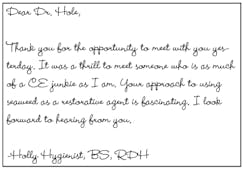How to interview for your first position as a dental hygienist
Editor’s Note: The following is an excerpt from the dental hygiene-specific career guide, The Purple Guide: Paper Persona, and offers interviewing tips for the dental hygiene graduate.
By Heidi Emmerling, RDH, PhD and Shirley Gutkowski, RDH, BSDH
April 18, 2013
Just as a strong resume wins you an opportunity to interview, strong interview skills will win you consideration for the job. Here are some tips for successful interviewing:
- Prepare your other materials to bring. Get your extra resume, photo, presentation portfolio, list of references, and any other necessary documents ready the day before the interview. Bring the contact information for three to five professional references. Do not forget to get permission to use their names, and ask how they prefer to be contacted. Send the references a copy of your resume too.
- Don’t be too early. Arriving more than 10 minutes early for an interview shows you don’t manage time well. Act as if your time is as valuable as the interviewer’s.
- Make sure the receptionist knows when you arrive. The front office staff may not be expecting you or may think you are waiting on a patient and ignore you. By the way, be super nice to the receptionist; it is the right thing to do, plus frequently s/he is the dentist’s spouse.
- Avoid nervous verbal ticks. The “ummms,” “likes,” and “you knows” can be kept at bay by pausing for a few seconds to gather your thoughts before each response. It’s better to pause and have silence than to say, “Ahhh.” Really, the pause is not as long as it seems.
- Do not talk too much. A general rule is to speak one-third of the time and definitely no more than half of the time. Keep answers to two to three minutes at the most. When you limit time, you tend to stay more focused. It is very easy to stray off the subject and ramble about things irrelevant to the job. Of course don’t interrupt or argue.
- Follow the interviewer. Model the interviewer’s style, body language, and rate of speech. Show that you have been listening by asking good questions and making good comments.
- Use the third person when talking about the job. (“Does the dental hygienist schedule the recall appointments?” rather than “Will I be scheduling the recall appointments?”) Avoid sounding as though you assume the job is yours.
- Sell yourself. Prepare and rehearse sound bites about yourself.
- Explain why you left. Needing more hours, wanting to work close to home, or needing to take time off to volunteer at your child’s school are legitimate, generic reasons. Keep your tone positive and leave behind the soap-opera drama from your previous job.
- Ask the world’s best interview question. Great questions to ask early in a job interview are “What are you most hoping to find in the person you hire?” and “What would be first job priorities here?” The earlier you can ask these questions, the sooner you can start tailoring answers to the employer’s priorities.
- Be prepared to ask questionsto ask at the end of the interview. Gather data from the practice Web site to really wow the interviewer. Here’s a good basic question: “Based on what we’ve talked about today, I feel good about the position. Do you have any concerns about my ability to do the job?” Often, that gives you a chance to counter any objections. If the interviewer asks if you have any questions, never say no. They want to know you are interested and that you want to know as much as possible.
- Avoid the topic of salary and benefits until the offer. Let them bring up the subject of money. If you are asked about salary expectations too early in the process, explain that you’d rather postpone that discussion until you have more information about the position. Certainly know what and how you are getting paid before starting.
- Be prepared for some off the wall or illegal questions. Some offices justify throwing a curve ball to see how quickly you can recover and think on your feet. Decide in advance how to respond to illegal questions and just know that sometimes interviews are intentionally odd. Sometimes the interviewer asks their staff to act wacky just to see what you will do. Some scenarios include having someone have their fly open, asking you to submit to a handwriting analysis, or presenting you with a personality quiz to take.
The Thank-You Note
The note should be sent out immediately, preferably the same day, and should be very short and sweet. Merely thank the interviewer for the time. Include a few specific references to some interview highlights. Some people say it is okay to send an email thank you if this is the way you and the potential employer have been communicating all along. We believe the handwritten note is by far the better way to go. Do not follow the excellent example included word for word. Make it your own.








